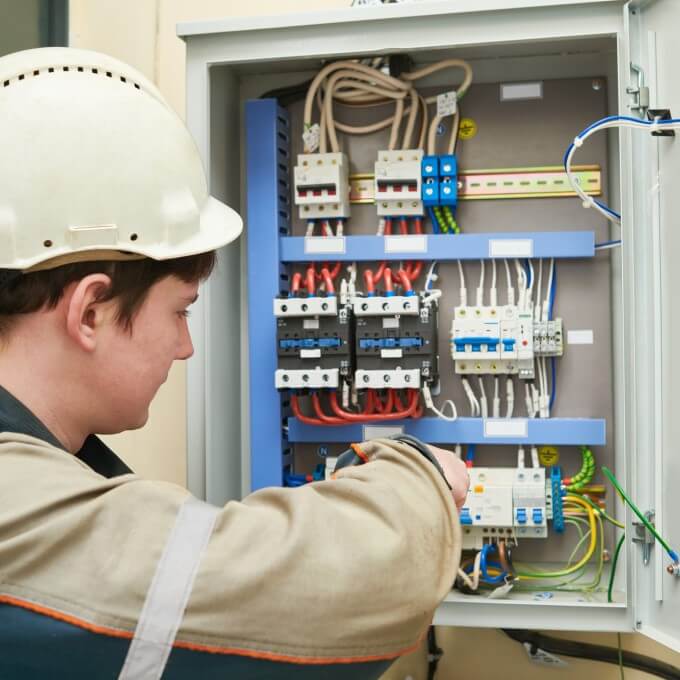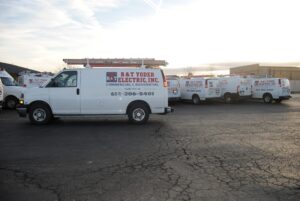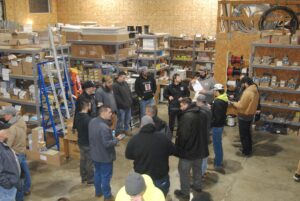
In the world of electrical systems, a breaker box plays a vital role in ensuring the safety and functionality of your home or business. As the heart of your electrical system, a breaker box, also known as a circuit breaker panel or fuse box, is responsible for distributing power to the various circuits throughout your property. At R & T Yoder Electric, Inc., a family-owned and operated business with a rich history of expertise in the industry, we understand the importance of a well-maintained breaker box. With our team of highly skilled electricians, you can trust us to handle any electrical job with professionalism and precision, ensuring that your breaker box is in top condition to keep your property safe and operational. Trust Yoder Electric to get the job done right every time.
What is a Breaker Box
Have you ever looked at your home’s electrical panel and wondered what exactly is inside? In this article, we will dive deep into the world of breaker boxes and explore their importance in your home’s electrical system.
Understanding the Basics
Let’s start with the basics – what exactly is a breaker box? Also known as a circuit breaker panel or electrical panel, a breaker box is the central distribution point for electrical circuits in your home. It is responsible for controlling the flow of electricity from the main power supply to the various outlets, fixtures, and appliances throughout your home.
It’s like the brain of your home’s electrical system, regulating the power and keeping everything running smoothly and safely.
How Does a Breaker Box Work?
Breaker boxes contain circuit breakers, which are designed to interrupt the flow of electricity in case of an overload or short circuit. When too much electricity flows through a circuit, the breaker trips and cuts off power to that specific circuit, preventing damage to your electrical system and potential fires.
This mechanism is crucial for protecting your home and ensuring the safety of you and your family.
Components of a Breaker Box
Let’s take a closer look at the different components that make up a typical breaker box:
- Main Breaker: This is the switch that controls the flow of electricity from the main power supply into your home. It is usually the largest breaker in the box and is designed to shut off all power in case of an emergency.
- Circuit Breakers: These smaller switches control the flow of electricity to individual circuits in your home. Each circuit is responsible for powering specific areas or appliances, such as the kitchen, living room, or HVAC system.
- Bus Bars: These metal bars distribute electricity from the main breaker to the individual circuit breakers. They form the backbone of the breaker box and ensure that power is distributed safely and effectively.
Common Types of Circuit Breakers
There are several types of circuit breakers that you may find in a typical breaker box. Here are some of the most common ones:
- Standard Circuit Breakers: These are the most basic type of circuit breakers and are designed to trip when the current exceeds a certain threshold. They are used for general circuits in your home.
- AFCI Breakers: Arc Fault Circuit Interrupters (AFCI) breakers are designed to detect arcs in electrical circuits, which can be a common cause of electrical fires. They provide an extra layer of protection for your home.
- GFCI Breakers: Ground Fault Circuit Interrupters (GFCI) breakers are designed to protect against electrical shocks in wet areas such as bathrooms, kitchens, and outdoor outlets. They monitor the flow of electricity and trip when they detect a ground fault.
- Dual Function Breakers: These breakers combine the features of both AFCI and GFCI breakers, providing comprehensive protection for your electrical system.
Signs of a Problem
Now that you know more about how a breaker box works, let’s discuss some common signs that indicate there may be an issue with your breaker box:
- Frequent Tripping: If your circuit breakers are tripping frequently, it could be a sign of an overloaded circuit or a faulty breaker. This can be caused by too many appliances connected to a single circuit or a malfunctioning appliance.
- Flickering Lights: If you notice your lights flickering or dimming randomly, it could indicate a problem with your electrical system. This could be due to loose connections, faulty wiring, or an overloaded circuit.
- Burning Smell: A burning smell coming from your breaker box is a serious issue that should not be ignored. This could indicate an overheating circuit or faulty wiring, which can pose a fire hazard.
- Buzzing Sounds: Unusual buzzing or humming sounds coming from your breaker box could indicate loose connections or arcing, which can be dangerous and should be addressed immediately.
Importance of Regular Maintenance
Regular maintenance of your breaker box is essential to ensure the safety and efficiency of your electrical system. Here are a few reasons why you should schedule routine maintenance for your breaker box:
- Safety: Regular maintenance helps identify and address potential hazards before they become a serious problem. This can prevent electrical fires, shocks, and other safety hazards.
- Efficiency: By keeping your breaker box in good condition, you can ensure that your electrical system operates efficiently and reliably. This can help prevent unexpected outages and costly repairs.
- Longevity: Proper maintenance can extend the lifespan of your breaker box and other electrical components, saving you money in the long run. It can also help prevent the need for costly replacements.
Hiring a Professional Electrician
When it comes to maintenance, repairs, or upgrades to your breaker box, it’s crucial to hire a professional electrician. Attempting to work on your breaker box yourself can be dangerous and may result in injury or damage to your electrical system.
A licensed electrician has the knowledge, experience, and tools to safely and effectively work on your electrical system. They can identify and address any issues with your breaker box, perform necessary repairs, and ensure that everything is up to code.
A breaker box is a vital component of your home’s electrical system, responsible for distributing power to different circuits and protecting your home from electrical hazards. Understanding how your breaker box works, recognizing common signs of a problem, and scheduling regular maintenance are all essential steps to ensure the safety and efficiency of your electrical system.
If you have any concerns about your breaker box or need professional assistance, don’t hesitate to reach out to a trusted electrician like Yoder Electric. Remember, safety always comes first when it comes to electricity!







